Attention in the social sciences is focusing on the impact of globalization on cultural as well as national identities of immigrants. It is argued that improved global links is having an effect on how immigrants form identities in two main ways. First, globalization has created a “global locality” by making it easy to establish communication links with various communities in different parts of the world, thus making it possible to know what happens in those cultures. A significant number of Australian immigrants are from the Middle East especially from countries such as Yemen, Iraq, Iran, Afghanistan, Dubai and Saudi Arabia. The Middle Easterns are traditionally Muslims and such the sustenance of their Muslim identity is vital. Globalization helps them to keep track with what is happening back in their home countries. The ability to maintain contacts with their cultural roots means that their Muslim identity is not lost. They thus derive a sense of pride in their Muslim identity. However, this pride is affected by negative stereotyping. Secondly, globalization has improved social interactions globally as such these immigrants are able to keep pace with what is happening in other parts of the world. Westernization, especially American cultures largely influences the global culture. Thus national identities of such immigrants have been rendered susceptible to the influences of global locality culture as it may lead to the adoption of the global culture. Therefore their national identity is affected by the open global society.
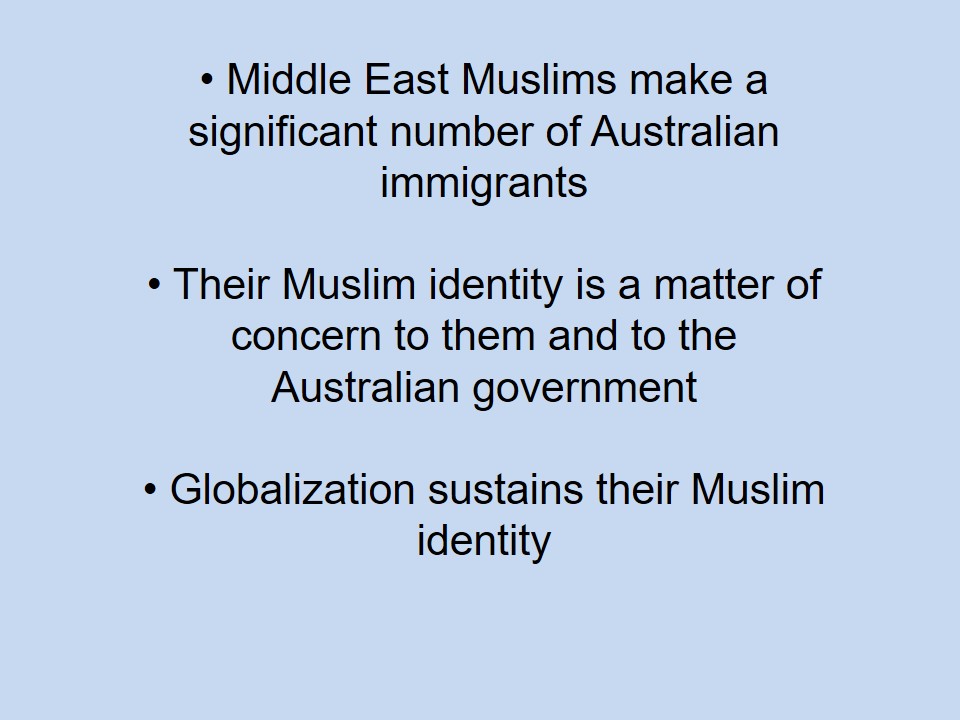
Nationalism can be termed as the mind-set and the actions that the citizens of a given country have in relation to forming certain traits that they esteem as crucial in identifying their unique distinctiveness over other citizens of other countries. Such attitudes and actions constitute the self determination of that country. Nationalism creates a shared self-awareness a psychological condition amongst people of a given state that makes it possible to identify themselves as belonging to that country. Middle Easterners in Australia esteem to uphold their national identities and identify through religion, dressing mannerism.
Nationalism: Unique attitudes and behaviors portrayed by citizens of a given county.
National identity: Understanding of such traits and the psychological conditioning amongst citizens of that country.
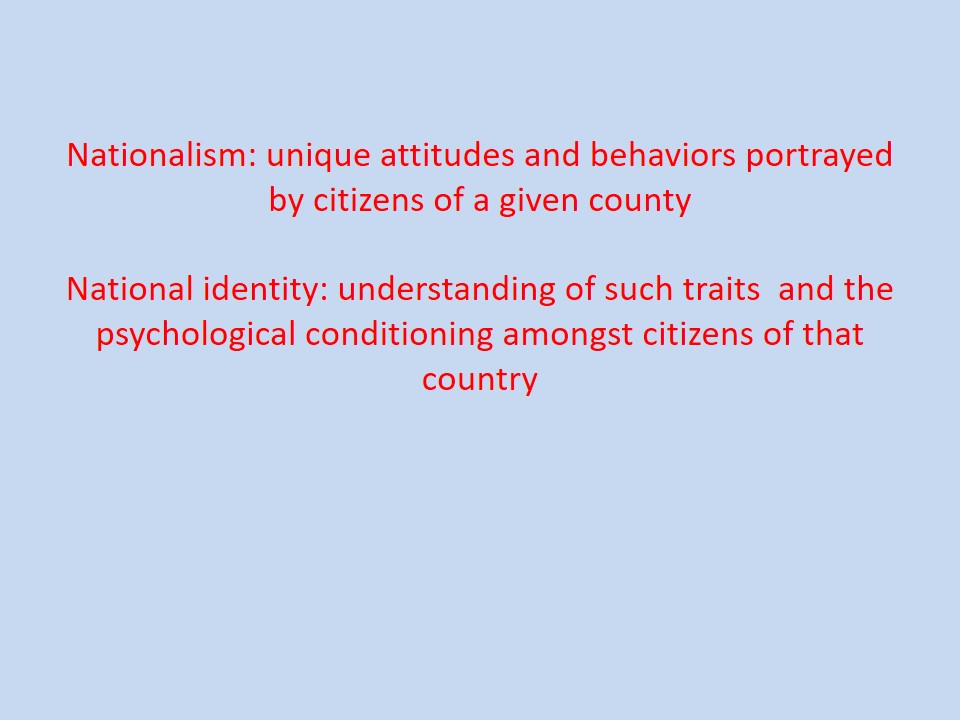
Morris Theory
Bicultural identity: results from the affects of globalization on national identity formation.
Globalization only dilutes the surface identity and leaves the deep structural identities intact.
There are a number of social science theorists who have come with different ideas on how national identities are formed. One such theory is the Morris Theory. Morris explains that globalization does affect cultures as the it has made it easy for people to to interact and accept different cultures from many parts of the world (2002). The Continued interaction with these cultures leads to weakening of national identities. However, only the surface identity is diluted. Surface identity is identified as the outward expression of identity in ways such as dressing. This means that the deep structural formation of cultural identity is not affected by globalization. This means that even through such individuals do adopt new surface identity the underlying cultural orientation of their native countries still exists. This leads to the formation of a bicultural identity a hybrid of both local and global cultures.
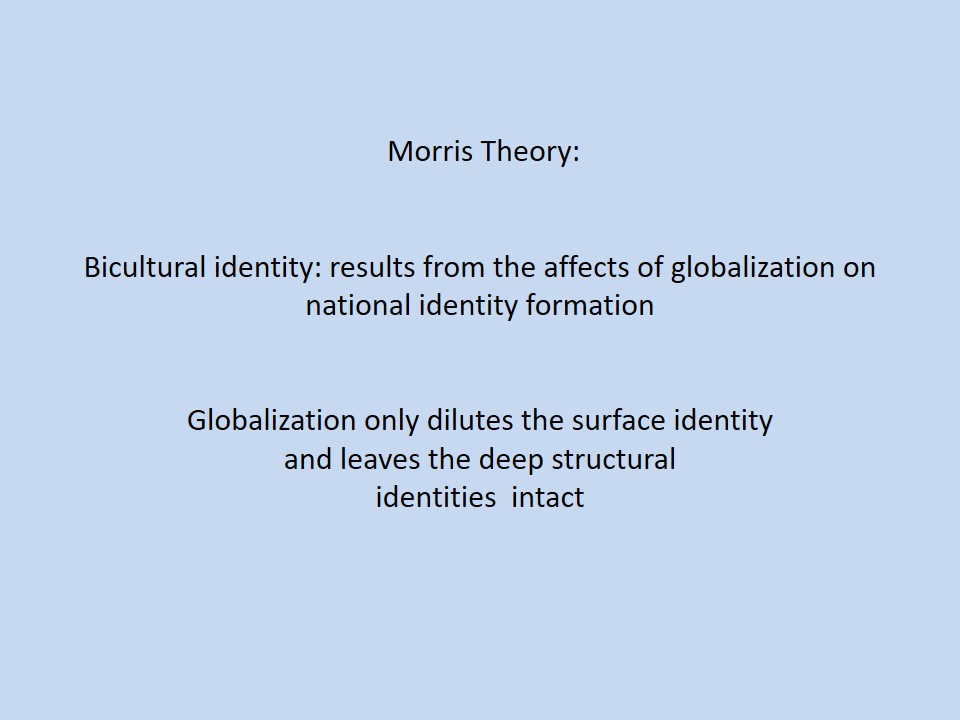
This theory identifies that the formation of such a hybrid culture involves the movement of ideas and cultural symbols across cultures.
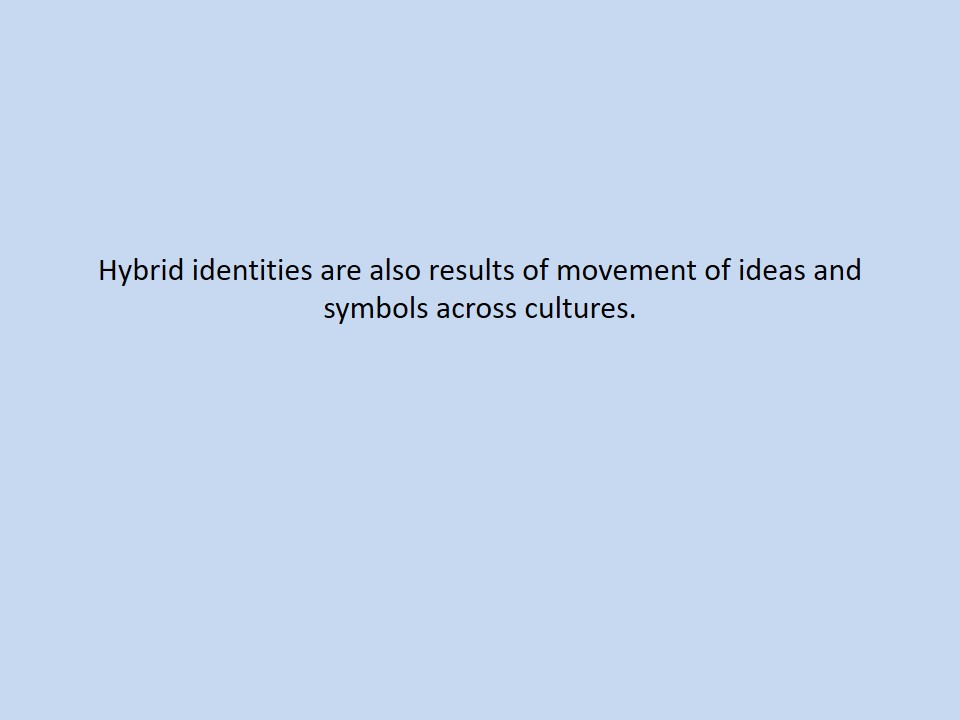
The great irony
- Access to global culture limited by the social class.
- Globalization the result of hybridization of cultures.
- The result is the culture of confusion.
Socio-economic configuration of the community determines the effect of globalization of cultural identity formation. A majority of the poor people do feel insecure as they do not have the necessary resources to access global culture. However, criticism of this theory explains that globalization is the result of the crossbreeding of cultures and as such as many people as possible do participate in global cultures. Morris also argues that globalization influences native cultures which lead to a confusion of identities especially in the youth. This postulate that the hybrid cultures are thus cultures of confusion. Such confusions lead to a sense of insecurity amongst the youths.
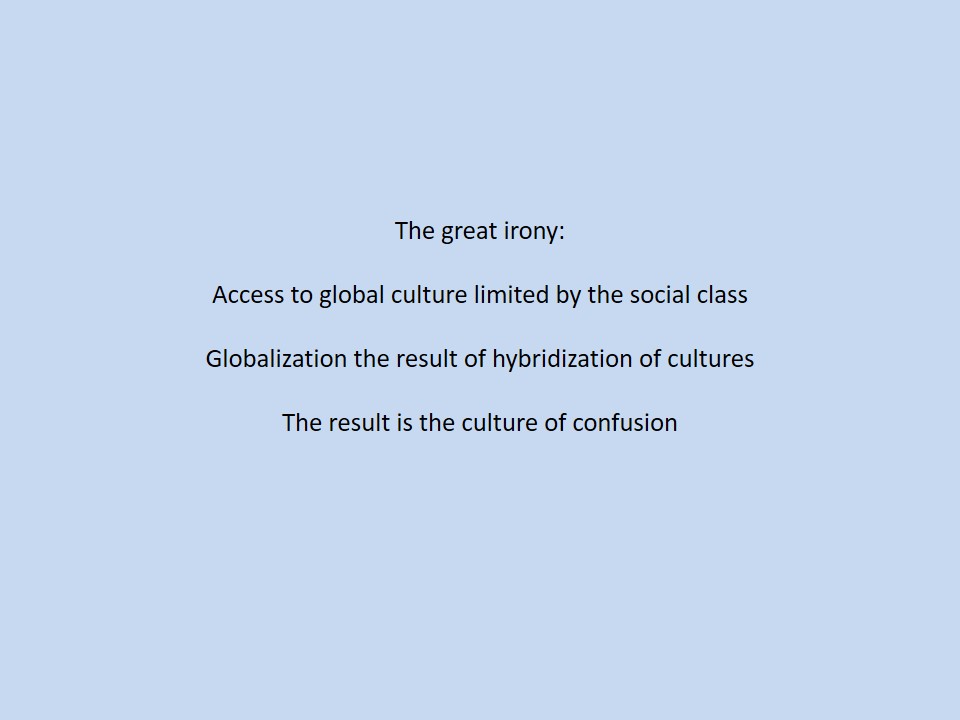
The Great Debate
- Is the movement of ideas single directional or multidirectional.
- In what ways does the limited access to global culture influence the youths to embrace it further?
- What is the relationship between hybridization of culture and globalization?
- How does the bicultural reflected in middle easterners in Australia?
- What are he effects of Biculturalism to the Australian society?
The great confusion
There are some grey areas though that needs further elaboration and will provide opportunities for further discussions. The theory proposes certain inordinate relationships such as between globalization and hybridization, global culture and the youth
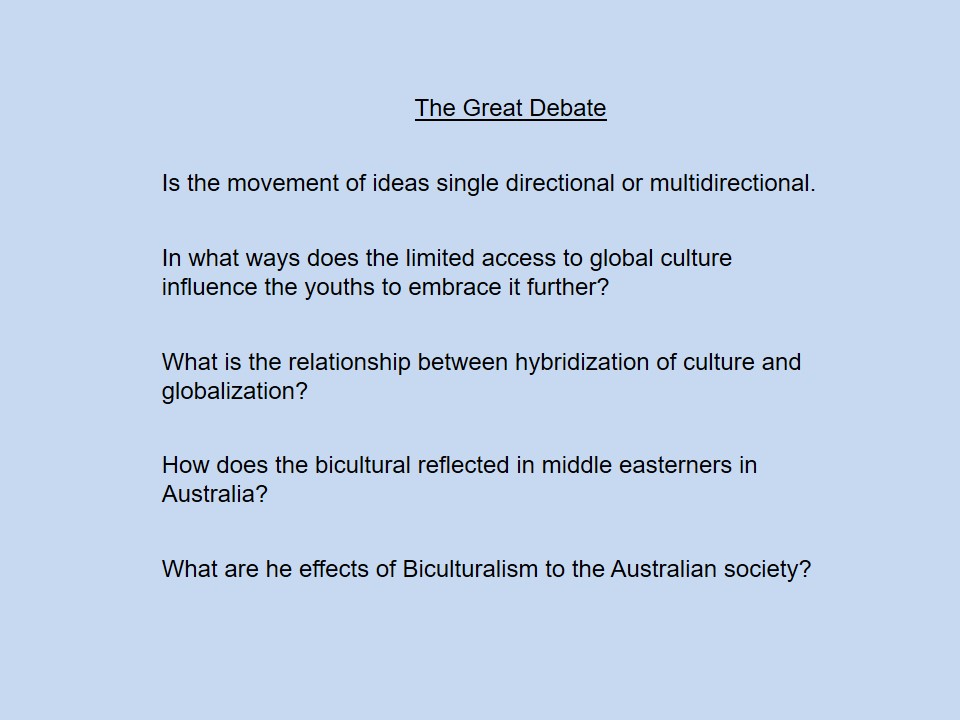
Globalization has a big influence on the way Middle Easterners form their identities. This paper defines globalization as the amplification of the universal social interactions which in effect leads to two way exchange of cultures. Local events are shaped by occurrences in other pars of the world while local happenings shape happening in other parts of the world. This creates a global society in that the whole world has been condensed into just one locality the global locality. Localization of the world means that local communities have become exposed and usually succumb to the global influences. Some of the cultural norms especially the western cultures become more influential than others. This is termed as western cultural imperialism (Tomlinson 1991; Shepard and Heyduk 2002).
- Globalization opens up a socialization super highway such that local communities interacts with other communities in other parts of the world (brings them together).
- A global locality is born with westernization the homogenizer of the new global culture formed.
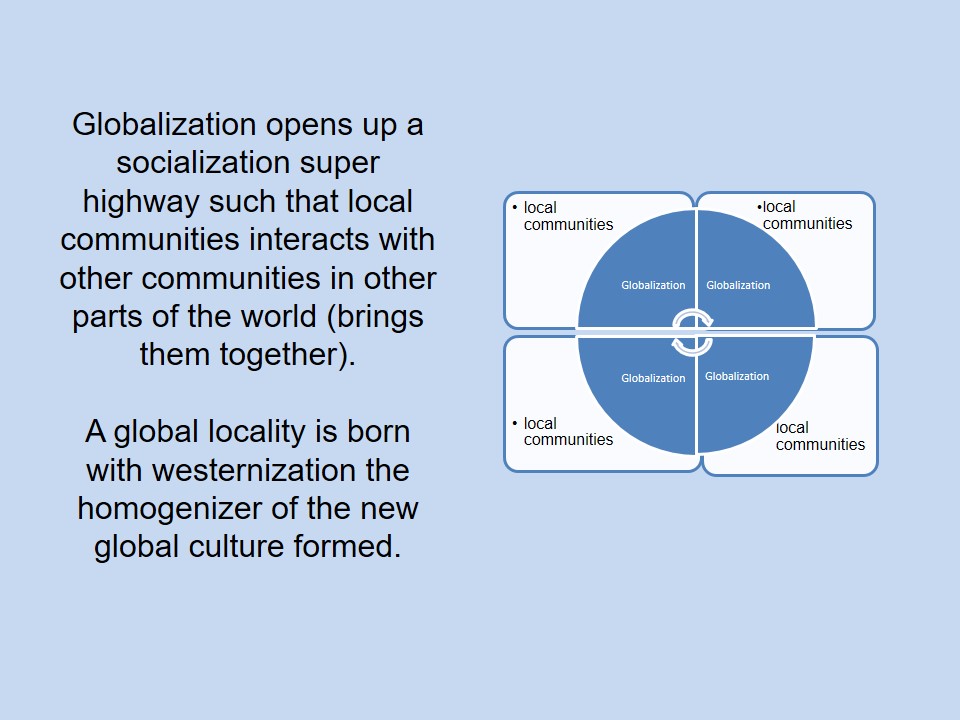
Globalization
- the channel that the Middle Easterners needs to keep in touch with their cultural roots.
- The touch with the Muslim base is not lost.
- Thus sustenance of national cultures.
Opening up of the socialization creates interaction links that allows for exchange of cultures. Therefore the ability to keep track with occurrences in different parts of the world means that Middle Easterners are able to keep themselves informed with what is happing back in their home countries. In this case they are able to keep in touch with their cultural roots. Globalization therefore enhances the sustenance of native identities which is predominantly Muslim. That the reason why they have been able to maintain their Muslim identity in their country of adoption Australia. Such identity is maintained at the family level as well as the individual level (Naidoo 2007).
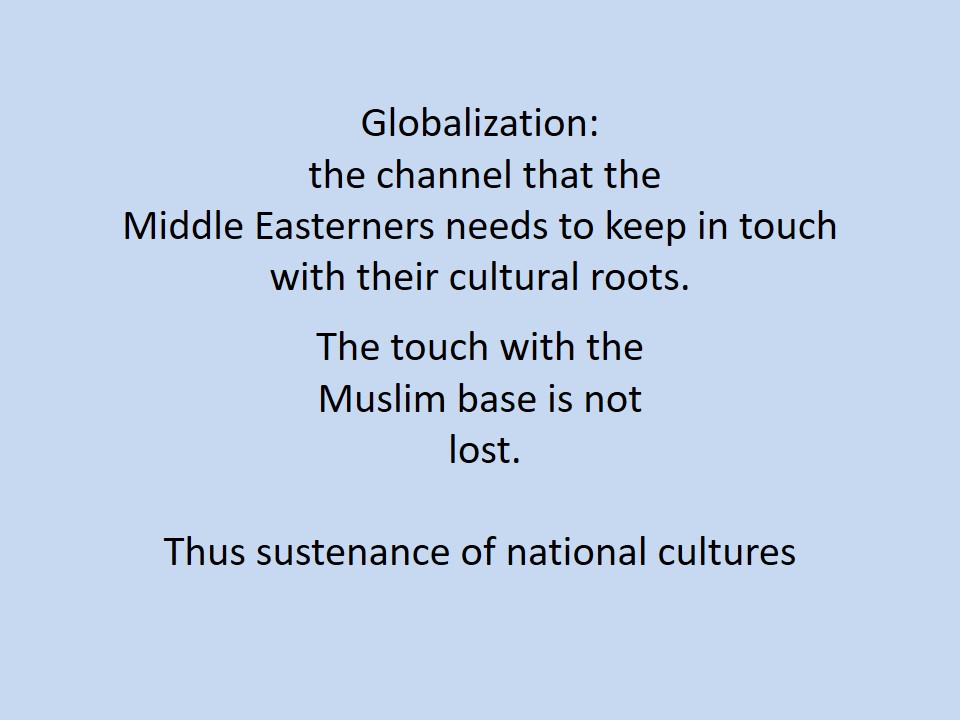
- The flip side of globalization effect on cultural identify formation is cultural erosion.
- Informazisation of the modern world through mass media creates too much freedom which leads to too much westernization of
the middle easterner Australian immigrant.
There is the flipside to this issue of globalization and the community identity formation. The flow if information through a number of mechanisms and channels such as the internet, mass media and film mean that there is glut of information easily accessible by any one. Therefore people all over the world are able to discover what is happening in all other parts of the world. The internet for example has a lot of information about the current trends, this deepens the awareness of global affairs and as such people become world conscious citizens. There thus emerges a feeling of acceptance of the global culture and as cultures is readily embraced. More and more people feel that they are thus part of the global culture which is dominated by westernization. Slowly and sometimes involuntary there is the adoption of western cultural values. Their local identify thus starts to wither slowly. Most of the Middle Easterners have found themselves in this fix. This is because, Australia sis a more secular culture. Because of the freedom that comes with such a culture they find it easy to ignore some of the rigid Muslim cultural norms. Thus their cultural identity id ruptured (Naidoo 2007; Giddens 1991).
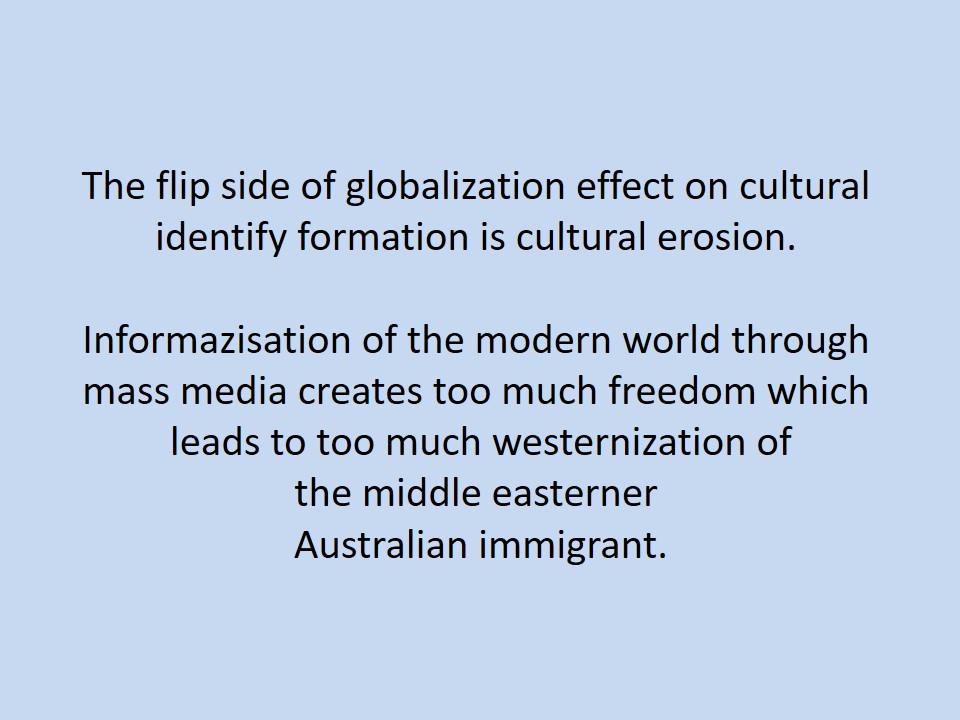
The effects of globalization on cultural and identity formation of Middle East Australian immigrants can be summed up in two contrasting ways: it lead to both the rupturing and continuity of their indigenous cultural values and norms (Naiddo 2007). Middle Easterners in Australia esteem that ability to keep in touch with their cultural roots as a way of extending their national identity in their country of adoption. They thus practice Muslim cultural values not just because of the freedom of worship that is guaranteed in Australia but as a way of expressing their solidarity with their native country identity. Thus continuity of there cultural identity is realized. However western cultural imperialism does slowly eat into their native cultural fabric. Thus lead to dissociation with some of the rigid Muslim cultural practices such as dressing and general mannerisms. Their culture is thus ruptured.
The paradox of the influence of globalization on the identity formation of middle east in Australia: it leads to both the continuity and discontinuity of cultural identity.
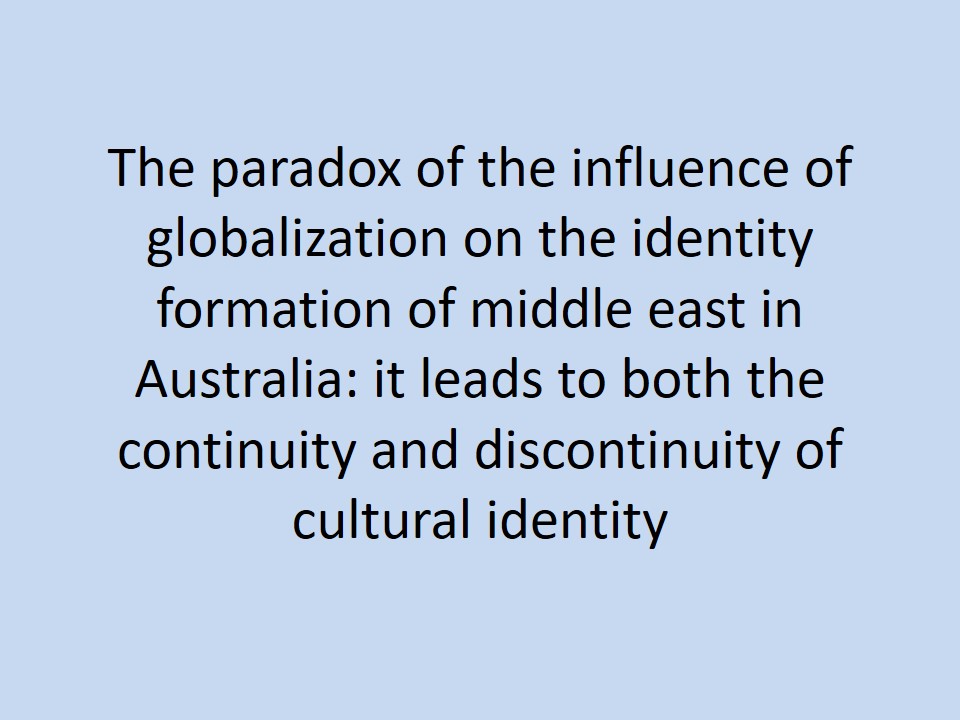
Such a paradox of occurrences has been witnessed in Lebanese’s Australian immigrants. These were not Muslim but of catholic dissent; the Eastern Catholic Rite and the Antiochean Church. Most of these Lebanese associated their Lebanese cultural with their religious practice; they did separate Lebanese Catholicism and Lebanese national identity. In this case they did not see themselves as part of the larger Roman Catholic church but as Lebanese Catholics. This means that their national identify played a big role in forming their religious identity. More fundamentally they identified themselves as Middles East Christians. The differences between the two types of Catholics were reflected in some of the religious activities such as prayer and conducting of the Eucharist mass. Faith and national identity was one thing. The effect is that the Australian catholic referred the Lebanese Catholics as “them”. However, long exposures to the Australian version of the Roman Catholic lead to a majority of them accepting part of the Roman Catholic world view. They thus involuntarily dropped some of the Lebanese catholic as well as Lebanese national culture (Ghosn 2010).
- The influence of religion on national as well as individual identity formation reflects this paradox.
- Lebanese Catholics thought their Lebanese Catholicism as part of their national culture until they accepted as part of the roman Catholicism.
- This acceptance was the beginning of the break with their national identity.
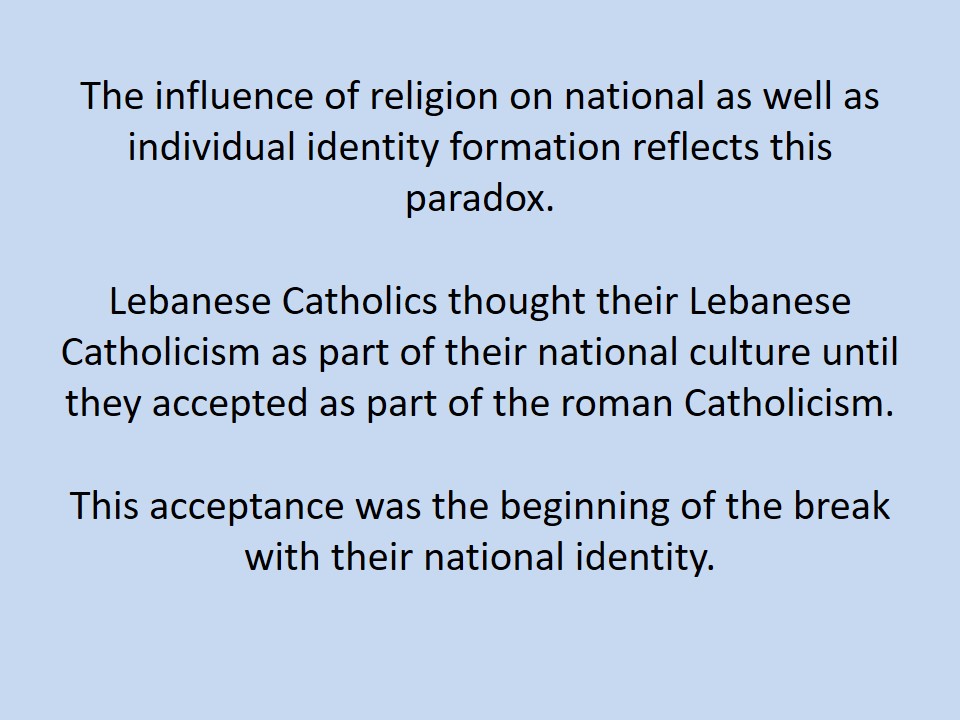
The common myth about the Muslim immigrants especially those from the middles east is that they have formed a unitary cultural identity. However nothing can be from the truth than this. The Middle Easterner Australians form a diverse Muslim identity due to a number of factors. These include their varied nationalities of origin. Members of the Muslim community in Australia come from a variety of counties such as Yemen, Lebanon. Iraq, Iran among other Middle East countries. Furthermore, the open Australian society compounds the matter. As such the Middle Easterners in Australia find themselves in the middle of an identity crisis. This affects the youth and the women more. They are torn between following the strict Muslim faith and the freedom of the largely secular Australian society. Such confusion is evident in their increasing limited understanding of the Muslim family and financial law. The extremely sexually permissive Australian society has created massive challenges for the identity of the Australian female Middle Easterner (Saeed and Akbarzadeh 2001).
The paradoxes does obscure the reality about the identity of the Middle Eastern Muslim: that there are diverse Muslim identities due to diverse countries of origin as well as the confusion created by the liberal Australian way of life.
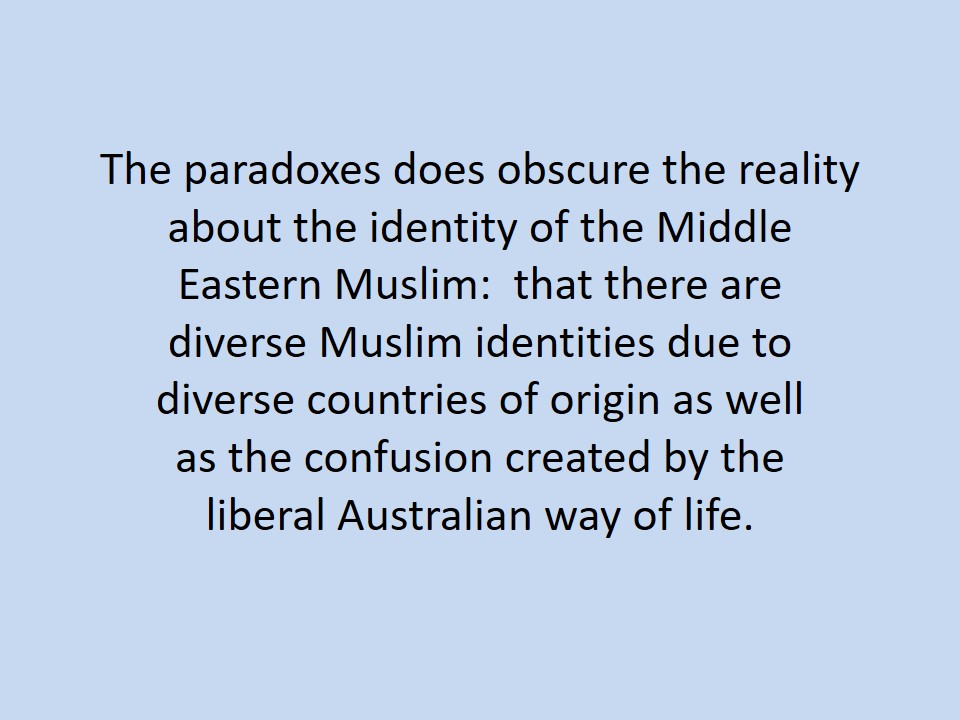
However, such exposure to secularism has not been in vain. The Australian government is the first in the world to develop an immigrant’s settlement scheme. This is aimed at ensuring that all immigrants are quickly integrated into the Australian way of life and become part of the Australian community contributing to its well being. Thus the Middles Easterners have found a ready home in Australia. The Australian constitution stipulates a highly secularised culture which largely appeals to all Australian immigrants including Middle Easterners. As such Muslims from Middle East have broken with radical Islam. They thus have formed the identity that they are good Muslims who are interested in the development of the Australian social cultural and political affairs. As such they completed shun any radical views and opinions. The exposure to secularism leads to depolarisation of a radical Islam identity. The new identity has had a number of benefits. Australian Middles Easterner are guaranteed equality in provision of human rights as well as job opportunities and other economic benefits. Thus a new breed of Australian is formed . This is the proud Muslim as Australian. This fosters a sense of nationalistic identity (Aly and Green 2008).
- Then liberal secular culture has lead to the formation of the good Muslim identity in Australia.
- This identity is reflects modernistic views devoid of radicalism.
- The good Muslim benefits equally with other Australians and develops proud to be Australian.
- A new identity is formed: a proud Australian Muslim this promotes nationalism.
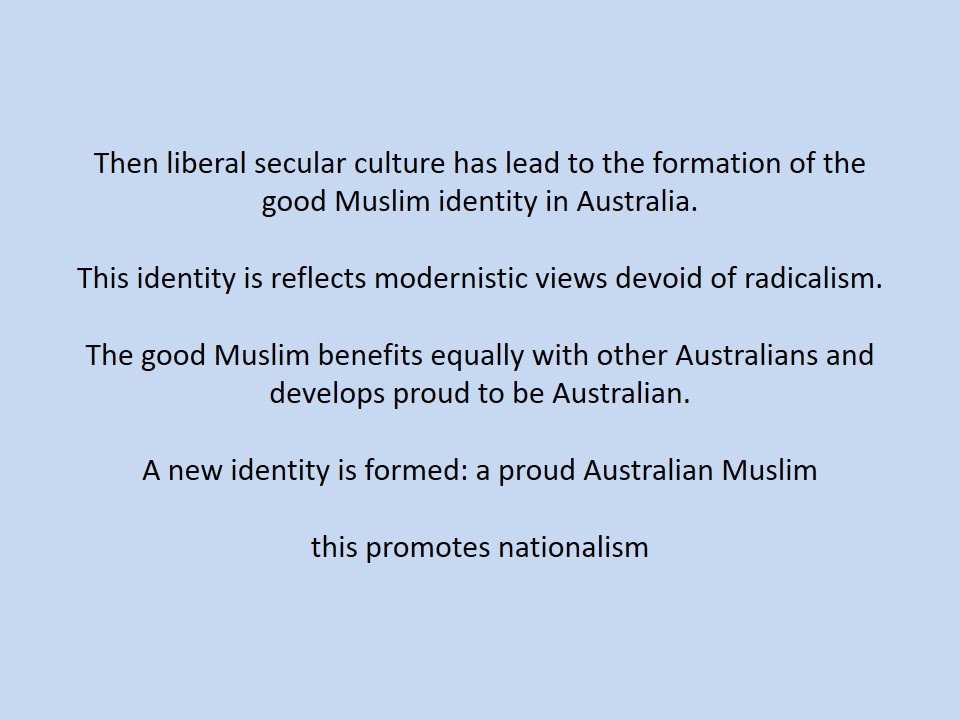
The new identity of the Australian Muslim Has had a significant effect on the entire Australian socio political set up. Australia is largely accommodative society and as such avoids much of the negative stereotyping of foreigners witnessed in other western countries such as the US especially against the Muslims. Other than the isolated but largely mild cases of racial mistreatment from native Australians, Australian Muslims are living a comfortably social life. They are treated as part of the mainstream Australian society and it is almost hard to tell the differences. This can also be attributed to the liberalization and secularisation of the Australian Muslim. As such Australian Muslims from Middle East have found a home in Australia. They now consider Australia as their new home and a rising number of them no longer hold nationalistic identities with the Middles East. This is not just a signification of loss of native identity with their native counties but also an ideological departure as some of them openly oppose such radical Islamic ideas such as male hegemony as well as jihadist ideas. This has led to the formation of a new identity of Australian Muslims who are openly vocal against retrogressive practices such extremist Islam. The new Muslim faces a number of challenges. It has been reported that the Australian Muslim faces all manner of discrimination especially regarding employment and education opportunities. Furthermore the Australian Muslim as stereotyping and is usually unfairly suspected of crime, is involved in drugs as well as being subjected to racial mistreatment (Bahfen 2008).
- The new Australian Muslim: the face of the new breed of Muslim that not only breaks with the nationalistic Middle East identities but also extremist Islam.
- The new Muslim faces a number of challenges: racism, suspicion of crime, drugs abuse and social political discrimination.
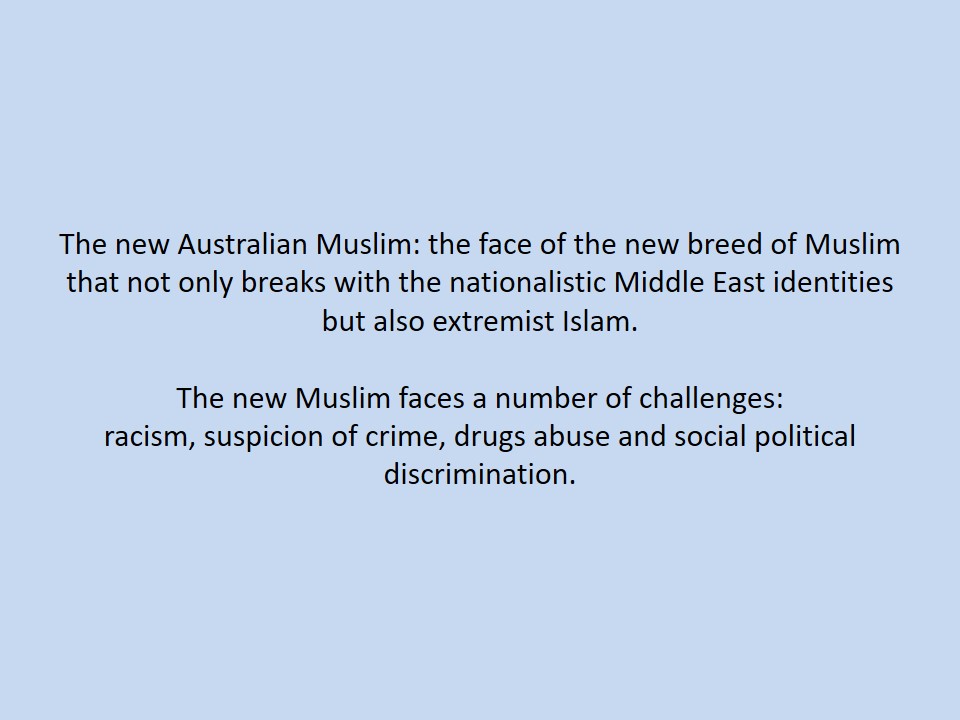
Globalization has localized the world with the establishment of global community connected through the improved information technology systems. However it is having other positive side effects. The ability of globalization to influence the formation of cultural identities is influencing global affairs. The face of the new liberated Muslim is the reflection of this.
Globalization has not only influenced global affairs but is also the vehicle through which new cultural identities are formed.
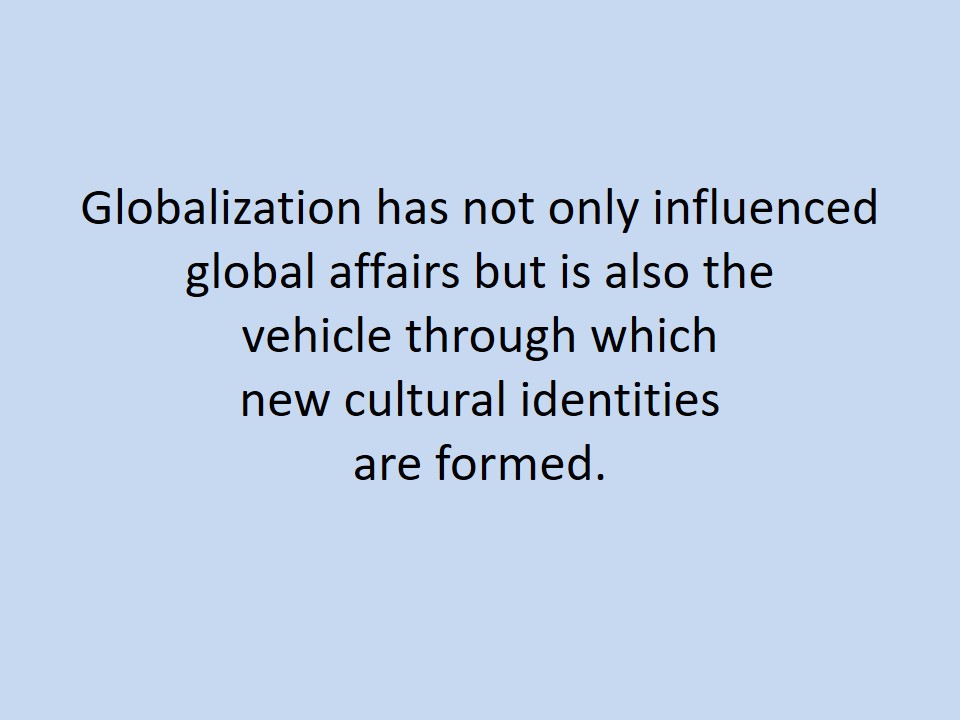
References
Aly, A. and Green, L. 2008. ‘Moderate Islam’: Defining the Good Citizen. Web.
Bahfen, N. 2008. Online Islamic Identity and Community in Australian and Three Neighboring Countries. Web.
Ghosn, M. 2010. Religious identity of young Australian Maronite Adults. Web.
Giddens, A. 1991. Modernity and self-identity: Self and society in the late modern age.
Cambridge: Polity PressNaidoo, L. 2007. Rupture or Continuity? The Impact of Globalization OnCultural Identity and Education in Indian Immigrant Families in Australia. Web.
Saeed, A and Akbarzadeh, S. 2001. Searching for Identity: Muslims in Australia . Web.
Shepard, B., & Hayduk, R. 2002. From ACT UP to the WTO: Urban Protest and Community Building in the Era of Globalization. New York: Verso.
Tomlinson, A. 1991. Cultural Imperialism. Baltimore: John Hopkins University Press.